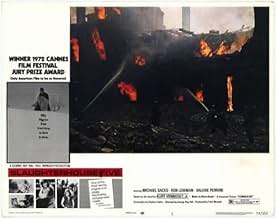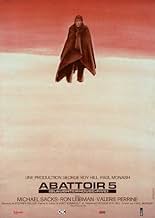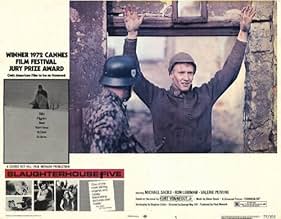Billy Pilgrim has mysteriously become unstuck in time. He goes on an uncontrollable trip back and forth from his birth in New York to life on a distant planet and back again to the horrors o... Read allBilly Pilgrim has mysteriously become unstuck in time. He goes on an uncontrollable trip back and forth from his birth in New York to life on a distant planet and back again to the horrors of the 1945 fire-bombing of Dresden.Billy Pilgrim has mysteriously become unstuck in time. He goes on an uncontrollable trip back and forth from his birth in New York to life on a distant planet and back again to the horrors of the 1945 fire-bombing of Dresden.
- Director
- Writers
- Stars
- Awards
- 3 wins & 4 nominations total
- German Leader
- (as Friedrich Ledebur)
- Young German Guard
- (as Nick Belle)
- Director
- Writers
- All cast & crew
- Production, box office & more at IMDbPro
Featured reviews
Hill won the best Director Oscar the next year with "The Sting". He later filmed the similarly unfilmable "World According To Garp" and also did a brilliant job with it, partially by letting go of John Irving's more depressing side. Other notable credits include Butch Cassidy... and The Great Waldo Pepper.
Michael Sacks, in his first movie, and only starring role at the tender age of 24, is completely convincing and natural. He is equally effective, compelling, and believable at the six distinct stages of Pilgrim's life memorialized herein. If he weren't up to the six-in-one role, the film wouldn't work, but he is, and it does. (I wonder why he has no other major credits, and ceased acting altogether in 1984. If anyone knows, please e-mail me.)
Valerie Perrine is fine as Montana Wildhack. The other characters are all played for maximum irony and effect, and the cast delivers beautifully, without exception. Eugene Roche is the epitome of kindness as Edgar Derby, the yin, to Ron Liebman's yang, a twisted ball of anger named Paul Lazaro. John Dehner is brilliant as a war-hawk professor upset at the Vietnam protesters. His character would be as appropriate amidst today's global conflagration as it was in 1966. Lucille Benson, Kevin Conway, Sorrell Booke, Holly Near, Richard Schaal, and Perry King are the more familiar names in a uniformly excellent cast, including the German actors.
The musical score is also perfect, both in tone and substance. Vonnegut is a master of superimposing satire over irony over futility. The movie does a marvelous job of blending these contrasts and making its audience feel enriched. The music underscores all of these contrasts. The cinematography also is magnificent.
Searching desperately for something to say to show that the movie cannot be 100% perfect, the only thing I can come up with is that the pacing of the movie drags slightly when the soldiers leave the first camp for Dresdner until their new Kommandant gives his "welcoming" speech. It might have played better with about three minutes cut from that sequence. So what?
I recently saw Slaughterhouse Five for the fifth time in 27 years since I originally saw it at my college campus -- this time on DVD. I never fail to catch something new, and I never fail to enjoy it all the more.
Given how many 70's movies have failed miserably to withstand the test of time, Slaughterhouse Five is a true treat to be savored.
Let me safely say that Kurt Vonneguts 'Slaughterhouse 5' is my favourite book ever. It is incredibly funny and moving above any book I've ever read. But it is also a very complex and philosophical story with many deeply rooted undertones. As such, I strongly urge people to READ THE BOOK before you see this movie. A great many points are left unexplained to the viewer, assuming they have read Vonneguts version. As I read it beforehand, the movie didn't insult my intelligence by putting Vonneguts ideas in plain view. Instead, it relies faithfully on the viewers interpretations, not unlike the book.
Once again, unless you have a mind open like a 7-11, READ THE BOOK. Take my advice, and be immersed in the greatest story of the 20th century.
If there's a weak element of the film, it's the bombing itself. By never letting the audience see outside the bomb shelter Pilgrim was in (and if so, not making it vivid enough for me to remember it), the horror and sheer magnitude of the event is downplayed. Two hundred thousand people died in the destruction of one of the greatest, most majestic cities in all of Europe, and all we're given is a shaking camera. Those who've read the book know that the trajedy was conveyed all to well by Vonnegut's skillful, near-photographic descriptions of the event and its aftermath. Very little of it made it to the screen.
Aside from that, George Roy Hill does an excellent job of communicating the existential dread of what must have been thought to be an unfilmable novel. The fate of Pilgrim's wife through her reckless driving could have come off as tasteless black comedy, but any cheap laughs are thankfully avoided, and the sequence is as shocking as it is heartbreaking. The really far-out parts of the novel (the four-dimensional aliens, Vonnegut's conception of the future and the end of the universe) are done with complete seriousness; another director might have had a condescending approach to the material, and killed the magic. The novel, by itself, is one of the best I've ever read -- it gleefully trashes the rules of standard novel-making, narration, and continuity, and manages to tell a real whale of a tale (there's a lot of weird stuff to swallow in it.) When I saw Hill credited as director, I moaned in agony, recalling the headaches that were induced by his smug, syrupy box office smashes "Butch Cassidy and the Sundance Kid" and "The Sting." After those two, I gave up all hope in Hill, the same way I did with Richard Lester after "Petulia" and "Help!" By the end of the movie, however, I ate my words. It's a beautiful, thought-provoking, and enchanting film, and does justice to a fine novel.
Did you know
- TriviaAlthough Kurt Vonnegut Jr.'s renowned refrain, "And so it goes", appears over 100 times in the novel, it it is not uttered even once in this film.
- GoofsWhen Billy Pilgrim is asked by the American soldiers, "Where's your rifle?", he replies that he doesn't have one because he's a chaplain's assistant. However, in the United States Army, the primary duty of the chaplain's assistant in a combat zone is to protect the chaplain, so all chaplain's assistants must carry rifles. Because Chaplains are considered ministers in uniform they are forbidden from carrying weapons even when in combat zone.
- Quotes
Billy Pilgrim: [in his sleep] You guys go on without me. I'll be alright.
Prof. Rumfoord: All he does in his sleep is quit, surrender, and apologize. I could carve a better man out of a banana.
- ConnectionsEdited into The Clock (2010)
- SoundtracksConcerto No. 5 for Harpsichord in F minor, BWV 1056 - 2nd movement 'Largo'
Written by Johann Sebastian Bach (as J.S. Bach)
Performed by Glenn Gould, Piano
Columbia Symphony Orchestra
Vladimir Goldschmann, Conductor
- How long is Slaughterhouse-Five?Powered by Alexa
Details
- Release date
- Country of origin
- Official sites
- Languages
- Also known as
- Schlachthof 5
- Filming locations
- Prague, Czech Republic(as Dresden)
- Production company
- See more company credits at IMDbPro
Box office
- Budget
- $3,200,000 (estimated)
- Runtime
- 1h 44m(104 min)
- Sound mix
- Aspect ratio
- 1.85 : 1












































